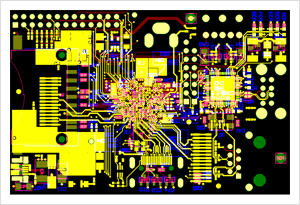Although Turkey Day is less than week away, things have been distinctly Labor Day-ish around here, at least as far as the weather goes. Following the Halloween snowstorm, it’s been mild and sunny, T-shirt weather.
Today is when my day job company does their annual Thanksgiving lunch, with all the fixings. So, before I become comatose from starch overdose, here’s a look at the week that was.
Apache and Eclipse: The Salvation Army of software
 It seems as if a week doesn’t go by without a major donation of remaindered code to an open-source foundation. But even recent large donations, such as Oracle’s donation of Hudson to Eclipse, are dwarfed by the announcement this week that Adobe is donating the entire Flex SDK to Apache.
It seems as if a week doesn’t go by without a major donation of remaindered code to an open-source foundation. But even recent large donations, such as Oracle’s donation of Hudson to Eclipse, are dwarfed by the announcement this week that Adobe is donating the entire Flex SDK to Apache.
Considering Adobe’s announcement last week that it plans to drop mobile support for Flash in favor of HTML5, this isn’t completely surprising. However, the speed with which Adobe is moving to divest itself of its Flash assets is somewhat breathtaking. By shedding Flex in this way, Adobe can concentrate on building its HTML5 portfolio without leaving existing Flex developers out in the cold.
Donating obsolete products to open source is a commendable effort, and one I wish more companies would undertake. Beyond allowing developers to tinker with the code and improve the product, it also can be a valuable teaching tool (either in a best-practices or bad-example function). Unfortunately, patent encumberment and corporate paranoia make it difficult to do.
This year, Thanksgiving dinner includes Raspberry Pi
 One of the reasons that the Arduino has become such a popular Maker platform is that it’s so cheap; if you hose one, you’re only out $20 or $30. Unfortunately, they’re also pretty primitive, both in terms of memory and how you have to code them. You can buy a Beagle board or similar kin, which can run Linux, but those are fairly expensive.
One of the reasons that the Arduino has become such a popular Maker platform is that it’s so cheap; if you hose one, you’re only out $20 or $30. Unfortunately, they’re also pretty primitive, both in terms of memory and how you have to code them. You can buy a Beagle board or similar kin, which can run Linux, but those are fairly expensive.
The Raspberry Pi is an attempt to create an affordable single-board that can run Linux and interface to consumer-level components. The organization building it just celebrated a milestone, finishing the final cut of the first-gen printed circuit board (PCB) design. This raises hopes that the single-board computer (SBC), with a price projected in the same range as Arduinos, may be available in the near future.
The Pi runs standard Linux ARM distributions, has a USB connector and HDMI out, and if it works as planned, should become the go-to board for homebrew hardware projects. The Arduino is a nice board, and it will continue to have an advantage for those who want pin-level I/O access. It shouldn’t be hard to jigger up a cheap USB-based general purpose input/output (GPIO) breakout board, however, so this advantage is likely to be fleeting.
Skynet v0.1 is now operational
People hoping for the eventual enslavement of humanity by sentient machines got good news this week. Researchers at MIT reported the development of a chip that contained 400 neuron-analog circuits. Unlike digital switches, these new circuits mimic the ion channel mechanism that is found in the brain.
The MIT team claims that the work will lead to better understanding of brain processes and the development of prosthetics, but we here at DWIR know the real truth. We have photos of Siri entering the building through a back door, and a witness claims to have seen a large man with an Austrian accent in the vicinity, looking for a student named Sarah Connor. Claims that the Tech Square parking garage control system refused to open the gate for anyone named Dave are still being investigated.
 Strata 2012 — The 2012 Strata Conference, being held Feb. 28-March 1 in Santa Clara, Calif., will offer three full days of hands-on data training and information-rich sessions. Strata brings together the people, tools, and technologies you need to make data work.
Strata 2012 — The 2012 Strata Conference, being held Feb. 28-March 1 in Santa Clara, Calif., will offer three full days of hands-on data training and information-rich sessions. Strata brings together the people, tools, and technologies you need to make data work.
Got news?
Please send tips and leads here.
Related:
